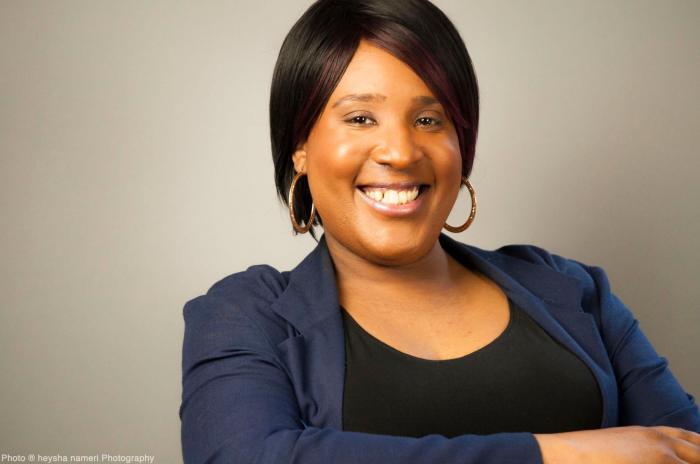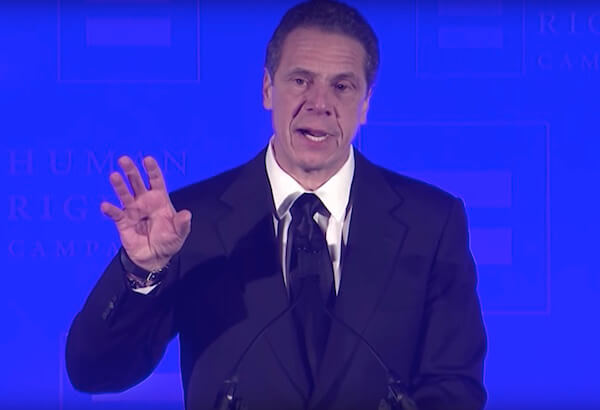Innocence Project attorney Karen Thompson. | KELLY COGSWELL
Last week I spoke with Karen Thompson about her work as a lawyer and lesbian advocate. (The quotes used in this article have been edited for clarity and length; watch the interview below or at gaycitynews.nyc/innocence-karen-thompson-video.) I first met her more than two decades ago when she was a street activist and Lesbian Avenger. It was only several years ago, while working in a huge international law firm, that she realized she wanted to focus on criminal defense work. One of her last cases at the firm was representing Patreese Johnson, one of the four young New Jersey women jailed for defending themselves during a homophobic attack in the West Village in 2006.
Besides insulting them, Dwayne Buckle had been caught on camera throwing cigarettes and spitting on them, before grabbing one of the young women by the throat. That’s when Johnson finally stabbed him, sending him to the hospital for five days. For this, she was sentenced to prison for 15 years, a substantially longer sentence than the 10 years a man might get for killing his girlfriend.
“That was part of the argument on appeal,” said Thompson, who took on her case after the initial guilty verdict. “First, that his wounds were not the serious physical injury required to convict someone of first-degree assault. And that secondly — does self-defense not count if you’re a dyke and you’re a dyke of color from Newark, New Jersey?”
PERSPECTIVE: A Dyke Abroad
Not if you’re a tabloid. The case was tried in the press. The New York Post ran the headline, “Attack of the Killer Lesbians,” characterizing Buckle as an innocent victim. The Daily News rejoiced at the verdict, with “Lesbian wolf pack guilty.”
The appeals courts largely disagreed, and in 2008 overturned the convictions of two of the NJ4, and later reduced the sentences of the two others. During the process, Thompson realized she wanted to be doing this kind of work, and joined the Innocence Project.
The Innocence Project
I asked her about the gender breakdown of her work because we mostly hear about men exonerated by the project, though the group just won freedom for a Nevada woman, Kirstin Lobato, who served more than a decade for a murder she did not commit. Thompson explained that it wasn’t just because many more men pass through the judicial system, but because certain types of violence are gendered.
“When you look at things like stranger rape, people who are kidnapping children and raping them. People who are breaking into women’s homes and raping them. People who are grabbing women off the street and raping them. That’s entirely men,” she explained. “I’ve never had one instance of a sheriff or a cop, or a case where the victim said, ‘Oh, my attacker was a woman.’”
Thompson affirmed that women do murder, but they mostly arrive in court for cases involving shaken babies, arson, and as accessories to crimes. And minor drug offenses. But since the Innocence Project relies primarily on DNA testing, they end up dealing primarily with rapes and sexual assaults.
“That’s kind of a weird way to put it, but… semen gets everywhere,” she said. “That’s our tag line. A little dark humor at the Innocence Project, but it’s true.”
Being an out lesbian impacts her work positively.
“Walking into a small town courtroom in Arkansas, the dyke thing is probably the least of my concerns,” Thompson said. “But what’s great about it is that I’m not limited to being nice. I’m not afraid of being called a bitch. Or a dyke. Because I’m not really seen as a woman in the same way. In those environments, my blackness supersedes my womanness. So, if I’m not fuckable, it doesn’t really matter, right? This means I get to be the best advocate for my clients. Because I don’t care what the repercussions are of acting like a man in a courtroom. It’s amazing to see what happens when you’re not apologetic.”
Women’s Spaces
Thompson is also working on a project called the We Want the Land Coalition. She helped establish the not-for-profit last year to buy the 651 acres of land in rural Michigan that’s the former site of the Michigan Womyn’s Music Festival. The goal is not a continuation of the festival. Instead, the organization is trying to preserve land that protects the water supply of a great many people.
Equally important is making the land available to self-identified women and girls from all over the world so they can use the space to host their own events and “create the next thing, the next space for women, for dykes, for all feminist folks, feminist-minded, community-minded people.”
Despite the #MeToo movement and new attention to discrimination against women, which ranges from constant interruptions while speaking to harassment in public spaces and overt violence, including the rape and murder she is all too familiar with, Thompson recognizes the difficulties women have whenever they try to set up their own spaces.
“Having space in a metaphorical and real way is how women have been able to create political space to get themselves free,” she said. “And it’s deeply, deeply threatening to power structures. If you’re at the top of the ladder you think that all people want to do is to turn the ladder upside down, so that people on the bottom are on top.” Thus beginning a new cycle of oppression, which she noted is not equality at all.
Dyke-baiting is one tool used against feminist organizers as well as lesbians. When a straight woman rejects a man’s advances, the first thing she’s accused of is being a dyke. When she talks too loudly, she’s called a dyke. Dykes, ironically, are always accused of being straight: “Have you tried it? How do you know you don’t like dick if you’ve never tried it before?,” Thompson said, quoting the refrain. “When you say you’re a lesbian, that’s always the reaction. That is about keeping political liberation from happening.”
Like any oppressed group, black people, too, have their intentions attacked any time they try to create some kind of separate space inaccessible to their oppressors.
“It’s not about you,” Thompson said. “That’s the other thing. It’s just not about you. Black people getting together is not about white people. Women getting together is not about men. It’s about creating a space for liberation. Our hope with the land is to make that space available for women to do that work again.”
For more information on the Innocence Project, visit innocenceproject.org. Read about the New Jersey Four in an NPR feature at goo.gl/J18uyu. More information about the We Want the Land Coalition is available at wwtlc.org.

































